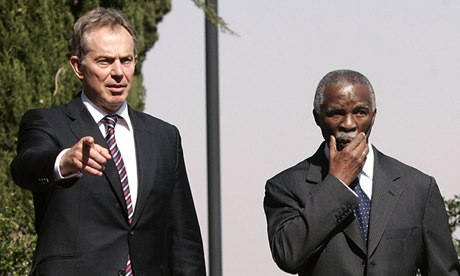Former South African president says his country was asked by UK for help with military plan to remove Robert Mugabe
 |
| Tony Blair with Thabo Mbeki in 2007. Mbeki has alleged that Blair pressured him to join a 'regime change scheme' in Zimbabwe. Photograph: Siphiwe Sibeko/Reuters |
Tony Blair and former South African president Thabo Mbeki clashed on Wednesday over claims that Britain had been prepared to use military force to overthrow Zimbabwean president Robert Mugabe.
Mbeki alleged that the former British prime minister pressured him to join a "regime change scheme" as Zimbabwe plunged into a political and economic crisis in the early 2000s. But the claim was strongly denied by Blair's office.
Both the UK as its former colonial power, and South Africa, its most powerful neighbour, have long played an intimate role in Zimbabwean affairs. But their leaders were divided on how to act when it descended into chaos following the violent seizures of white-owned farms. Blair, who had made a triumphant military intervention in Sierra Leone, was determined that Mugabe should step down whereas Mbeki was ready to accommodate him.
"The problem was, we were speaking from different positions," Mbeki said in an interview on al-Jazeera. "There were other people saying, 'Yes indeed there are political problems, economic problems, the best way to solve them is regime change. So Mugabe must go'. This was the difference. So they said, 'Mugabe must go'. We said 'But Mugabe is part of the solution to this problem'."
Mbeki made reference to a retired British general, thought to be Lord Guthrie, who was chief of the defence staff during the first Blair government. In an interview in 2007 Guthrie recalled that "people were always trying to get me to look at" toppling Mugabe by force, though he did not mention Blair by name.
Mbeki alleged that the former British prime minister pressured him to join a "regime change scheme" as Zimbabwe plunged into a political and economic crisis in the early 2000s. But the claim was strongly denied by Blair's office.
Both the UK as its former colonial power, and South Africa, its most powerful neighbour, have long played an intimate role in Zimbabwean affairs. But their leaders were divided on how to act when it descended into chaos following the violent seizures of white-owned farms. Blair, who had made a triumphant military intervention in Sierra Leone, was determined that Mugabe should step down whereas Mbeki was ready to accommodate him.
"The problem was, we were speaking from different positions," Mbeki said in an interview on al-Jazeera. "There were other people saying, 'Yes indeed there are political problems, economic problems, the best way to solve them is regime change. So Mugabe must go'. This was the difference. So they said, 'Mugabe must go'. We said 'But Mugabe is part of the solution to this problem'."
Mbeki made reference to a retired British general, thought to be Lord Guthrie, who was chief of the defence staff during the first Blair government. In an interview in 2007 Guthrie recalled that "people were always trying to get me to look at" toppling Mugabe by force, though he did not mention Blair by name.









No comments:
Post a Comment